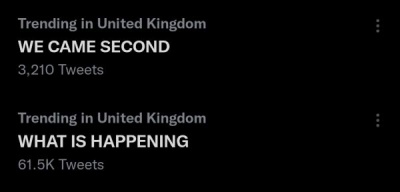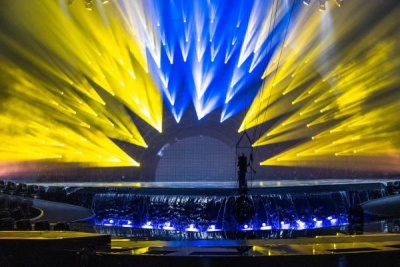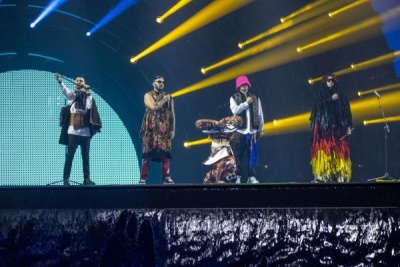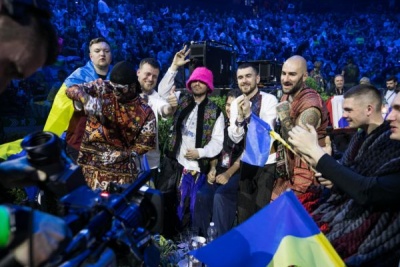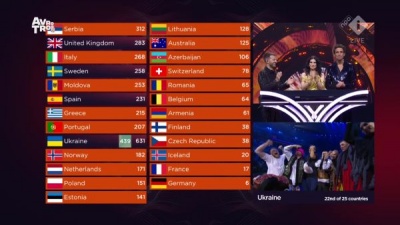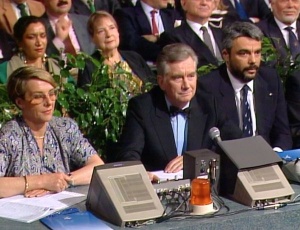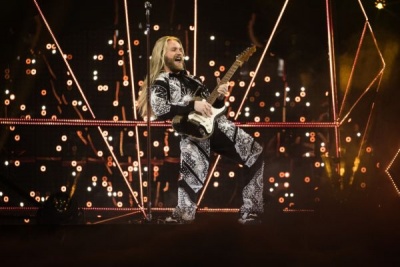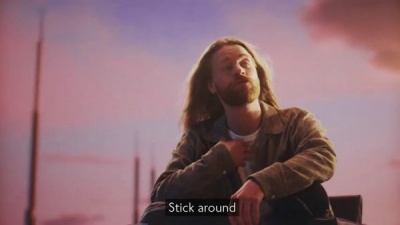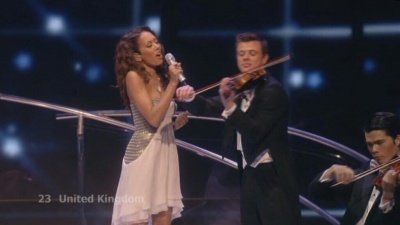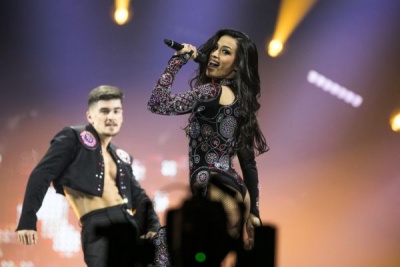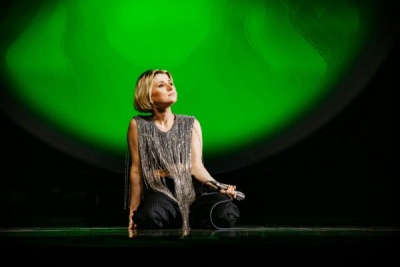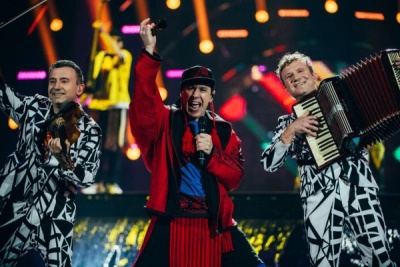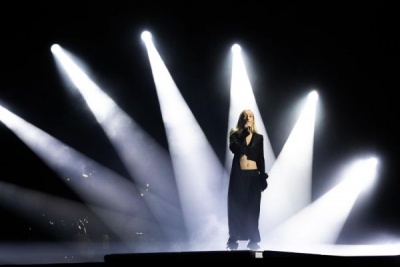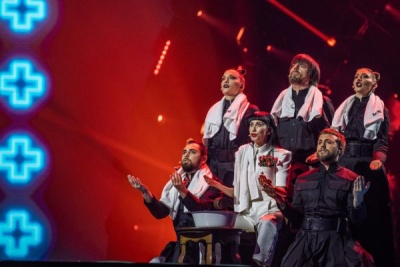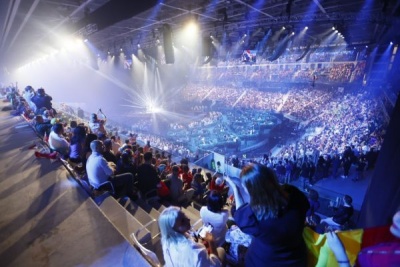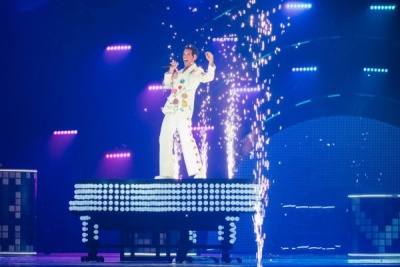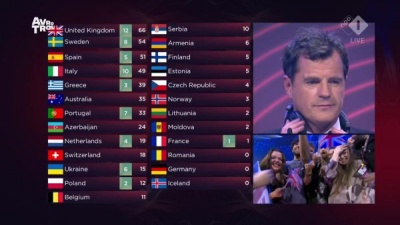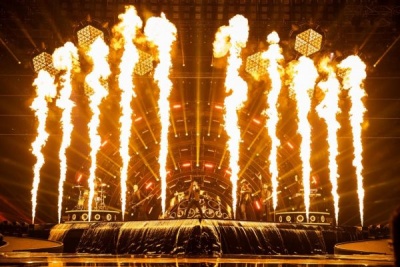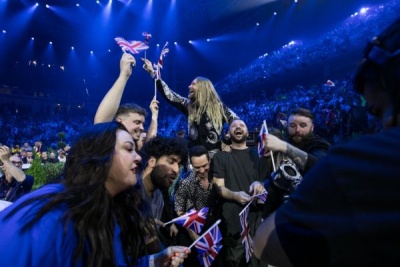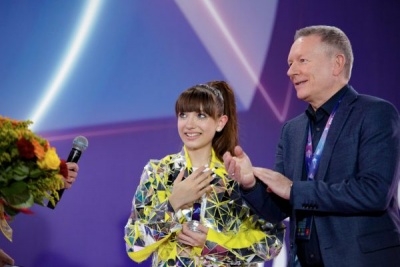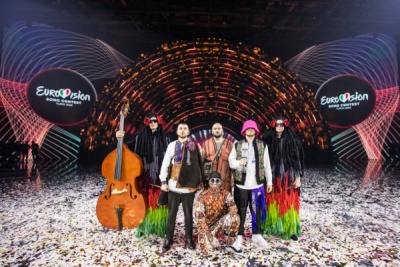Weaver's Week 2022-05-22
Last week | Weaver's Week Index | Next week
This edition of the week is brought to you by Milliways, the Restaurant at the End of the Universe. If you've done six impossible things in one evening, you've been watching
Contents |
Eurovision Song Contest
RAI / EBU, 14 May 2022
"Stefania" won the Eurovision Song Contest. Performed by the Kalush Orchestra, the entry from UA:PBC was decently popular with the tastemaker juries, and a runaway favourite with the peoples. The song is a huge success: did it win just because it bore the tag "Ukraine"?
What with one thing and another, anything with the tag "Ukraine" will attract a lot of sympathy at the moment. Quite rightly: the people have traditions and cultures stretching back centuries, and have been attacked by a plonker with a very big army and an even larger sense of entitlement. It's crystal clear who are the good guys and who are the baddies. UA:PBC could have sent six people farting in a lift and would still have won the televote by a landslide.
But UA:PBC sent a very good song. It's ethnic, in their local tradition; but it's not so ethnic as to dissuade other parts of the continent. It's authentic, something the men in the band wrote from the heart. And it's got depth: the song's about the hardships of being a mother.
The structure is fascinating. The chorus is in a folk song style, short sentences, elongated vowels. It portrays a picture of nostalgia, a young person looking back at their mother. The word "колискова " (lullaby) is repeated a lot. And then the verse is a contemporary rap style, talking about how hard it is to raise a child. By the end of the second verse, the singer vows to protect their mother, just as their mother protected them some years ago.
To that we add unusual instrumentation, flute motifs and other rare sounds. It's a potent mix, it contains many of the things juries as a whole tend to like, and only one thing – a shouty rap – that might turn them off. The performance on stage was assured, the band looked comfortable, and produced a strong entertainment package. Juries rewarded this combination, and "Stefania" came fourth on the jury vote.
When the Big Wodge televote arrived, it turned out "Stefania" was going to get the biggest wodge of all. The biggest Big Wodge in history, quite possibly a Big Wodge the wodginess of which we will never see again.
439 points. Four Hundred And Thirty Nine of your Eurovision points. Just from the televote. The total is 631, the winning margin 165 points.
Now, if UA:PBC actually had sent six men farting in a confined space, they might have got 439 televote points. They certainly wouldn't have come close to fourth place from the juries, and would probably have finished fourth overall. The public voted "Stefania" their runaway winner; the juries ratified that choice.
EBU: The contest is not political.
200 million viewers: Hold our collective beer.
Every year, the EBU issues a po-faced statement, claiming that Eurovision is a "non-political cultural event". This is, of course, a complete load of guff. This year, we know it's nonsense because the EBU rescinded an invitation to C1R/RTR, who would have competed under the label "Russia".
Every year, this column knows it's cobblers because the EBU choose to refer to songs by their broadcaster's country. This is a political choice, because the nation state is a political choice. The EBU has a very simple alternative: primarily refer to songs by their own name, like this column does. "Vote "Arcade"! Vote "Qami qami"! Vote "Embers", someone's got to!"
Back in the days when songs had awkward names, and voting was done over crackly phone lines, the EBU's choice was sensible. Imagine the spokesperson from CLT in Luxembourg City, talking in his third language of French, and over a phone line routed through the Eurovision Bacon Frying Championships. It's easier to hear "Yugoslavia, quatre point" than a horridly mangled impression of the song title.
These days, voting is done by app and phone number and SMS – you need to remember to vote for song 13, the broadcaster's nation barely relevant. The EBU would do well to run an experiment – show the song's name, not the broadcaster's territorial nation.
But the EBU chooses to prioritise the country. The result is inevitable. 200 million viewers engage in participatory democracy. It's simple and cheap to send a message, and that message is clearly and unmistakably and wholly political. The message from the public is either the International Sign of The Voice, or an iconic hand gesture at the criminal regime occupying parts of Ukraine.
Make no mistake, we do not begrudge "Stefania" any part of its success. While this column doesn't rate the song particularly high, we do appreciate what it's trying to do. And, in the imagery of Jon Jacobs, we're comfortable with the result – we wouldn't go back and change it. They might not be dancing on the streets of Kyiv, but they are cheering in the bomb shelters.
I'm up in second place, man
When we reviewed some of the songs in March, we expected the BBC's staging of "Space man" to be poor, cringeworthy, dull, anodyne, and not as good as it ought to be. We had good reason to be sceptical, the BBC hadn't delivered a staging worthy of its song since 2013. Turns out that past performance is not a guide to future outcomes. We were wrong.
They got the staging absolutely right. Sam appeared in a web of silver lights, a large wire mesh construction that looked like he was going to climb into a great glass box and float off up into the sky. It was memorable, and worked with a great song – dramatic, a slow build to the finale, and sung perfectly every single time.
They also got the promotion absolutely right. The song had already been on release for two weeks before the BBC confirmed it was their entry: during that time, over 200 stations across the then-Eurovision area picked it up and played it. (Sadly for Sam, a lot of those were in Russia, which proved less helpful.)
Then Sam went on a tour of medium-sized territories: expose the song on BNT and RTS and CT and AMPTV. These smaller broadcasters have the same voting power as SVT and ARD, but you might only need convince a few thousand people to start getting results. It helped that Sam was an established professional: known to younger viewers through success on TikTok, while older viewers will have enjoyed the way he can actually sing.
The song is a nifty throwback to many forebears. Musicologists have detected influences from Queen, Elton John, David Bowie, and some late-era Beatles motifs. It's a familiar package, tailored to Sam's falsetto. Perhaps he's closest in style to Mika, this year's co-host and interval performer. Sam performed the socks off the song, and was rightly awarded the Friday King of the Bungalow crown as top scorer amongst the juries.
Sam also won the Marcel Besançon award voted by the Press, for most impressive performance. The other winners – Konstrakta for the artistic performance of "In corpore sano". The songwriters Cornelia Jakobs, David Zandén, and Isa Molin won best composition for "Hold me closer". We'll discuss the other two songs later.
The "Barbara Dex" award for Most Striking Look has been retired, and replaced by the "You're a Vision" award for Most Notable Outfit; voting closes around the time this column is published.
What is happening next?
A number of frequently-held assumptions were shattered last weekend. The canard that the BBC cannot stage a song well? Disappeared in a cloud of smoke. The idea that a BBC entry cannot tour the continent and show their song? A workaround has been put in place: the BBC doesn't fund the tour, that's done by the performer's management. More noxious assumptions also fell away from view, particularly "It's all about politics". Not true, not in the sense that there's a massive plot against the name "United Kingdom".
The reason for the BBC's poor performance is quite simple. Eurovision will expose poor songs, and reward good ones. Over the past couple of decades, the BBC's songs have, with rare exception, been poor or even worse. It's almost as if the BBC has been reluctant to engage with Eurovision as it is – a contest where all 40 entries are equal. Some might interpret it as arrogance, expecting to send any old crud and be rewarded for it. No. Eurovision is a proper meritocracy: the good songs are rewarded, the bad songs are punished.
Whenever the BBC sends a good song – "Space man", "It's my time", "Come back" – it is rewarded with a very high place. Good songs garner good results. It really is very simple.
So, where next? It's clear that the creative partnership with TAP Media has been fruitful, there is no need to change a successful formula at this time. While many fans would be happy for Sam Ryder to return to the contest, we hope he doesn't – there is literally nothing he can gain from going back next year, and can only damage his reputation.
If the BBC and its contractors play their cards right, this could be the start of a new golden age. The scent of something new is in the air, an unusual combination of satisfaction and optimism. We hope it's like 1995, when "Love city groove" paved the way for international megahit "Ooh... aah... just a little bit", show winner "Love shine a light", and runner-up "Where are you".
Best of the rest
It's not just the BBC who can feel pleased with this year's efforts. TVE placed third; their entry "SloMo" was performed by Chanel, and gave "Spain" its best result in decades. "SloMo" confirms that Mediterranean bangers can do very well. It's a fast dance, with plenty of gyrations and swivelling. The lyric is just the right side of seedy, the vocal abilities tremendous.
The whole package was designed to appeal to viewers, and we weren't surprised that it finished third in the televote. We were surprised that so many jurors liked "SloMo", and ranked it third – aside from "Fuego" a few years back, this genre tends to struggle with the juries.
"SloMo" was performed immediately after "Brividi", Mahmood and Blanco's entry for hosts RAI ("Italy"). The moody bromance was talked up by tastemakers, but fell a little short of the very high expectations – sixth with the juries, eighth with the public. The performers had something magical on the stage at San Remo, but it was lacking in the final – have they rehearsed so much the magic is gone?
Whichever song breaks a run of strong songs will be punished, and "Rockstars" for ARD ("Germany") had that unfortunate fate. It's an OK song, but followed "Stefania" and got completely forgotten. The slice of American-influenced soft rock was sung earnestly and honestly, but felt a little artificial in the Eurovision Song Contest. Rapping and singing with little vocal range is great on the radio, but doesn't work in a competition. Nul points from the juries was harsh but deserved; six from the televote ensured Malik Harris would get something out of the show.
"Fulenn" by Alvan & Ahez, representing France Télévisions ("France"). The song is in Breton, and merged ancient myths with contemporary beats. "Fulenn" is a difficult song to appreciate on a first listen, and it wasn't helped by a chaotic performance. "Stefania" was in a similar space, and ate up all of the love. A smattering of televote points, and a strong jury mark from their friends at AMPTV.
"Hold me closer" came second in the jury vote, Cornelia Jakobs gave SVT ("Sweden") their traditional high place. Unlike SVT's last few entries, "Hold me closer" connected with the public as well, sixth in the televote. The secret of success? An excellent song. "Hold me closer" showcases Cornelia's powerful husky voice with an emotional melody, cogent lyric, and plenty of visual heft. Some have compared it to Robyn and Adele, the song nestles well on general airplay, and it feels like the big hit to come out of this year's contest.
"Trenuletul" was second in the televote, Zdob si Zdub and the Advahov Brothers for TVM ("Moldova"). Banging drums, cycling traffic cones, and now a train. Zdob si Zdub have brought the party to three decades of Eurovisions, and didn't disapoint this time around. Their place in the running order came after a run of five slower songs, a welcome burst of colourful energy.
Other jury favourites included three classy songs with female vocals. "Saudade, saudade", Maro for TVP ("Portugal"). It's the one performed by six women in a meditation circle, and sounds like six women channelling something greater. Maro's backing vocalists were finalists in RTP's selection show, and chosen so all would enjoy the Eurovision experience.
"Die together", Amanda Georgiadi Tenfjord for ERT 2.0 ("Greece"), the one with the broken chairs representing the broken relationship. It's expertly performed, but suffered from being in the middle of that run of slow songs – and got overshadowed by "Hold me closer" a little later.
"De diepte", S10 for AVROTROS ("Netherlands"), the one that goes "ooo-oooh, aaah-aaah". Perhaps a little too cold and isolated to be loved, Stien den Hollander got a lot of respect and admiration.
Televoters rewarded all three songs with a dollop of points. Televoters didn't reward the male singers in a similar slow vein – "Miss you" scored 5 (Jérémie Makiese for RTBF "Belgium"), "Fade to black" got 3 (Nadir Rustamli for Íctimai "Azerbaijan"), "Not the same" scored 2 (Sheldon Riley for SBS "Australia"). There was a big fat zero for "Boys do cry", Marius Bear's song for SRG SSR ("Switzerland"). All were loved by juries; perhaps the televoters skew more towards young women like themselves.
Breakout success of the year was "In corpore sano", Konstrakta's entry for RTS ("Serbia"). The bizarre one, with the singer washing her hands, performing in classical Latin, doing something with towels, and discussing the secret of Meghan Markle's healthy hair. It's a deep and meaningful song, drawing on performance art and classical chanting. The song uses allusion to critique repressive social norms.
It's about superficial judgements, how if someone looks good, they're presumed to be good. "An artist *must* be healthy", chant the backing chorus. But if the mind is sick, does that matter, so long as we look healthy? The washing of hands, done in a ritual manner, as if we didn't do that enough when we were told the disease was surface-bourne.
"In corpore sano" resonated with the juries, and resonated with the viewers. We didn't dare expect a top ten finish for it, and we're surprised and impressed that it chimed with so many people.
Allora!
The final began with a mass choir singing "Give peace a chance", followed by co-host Laura Pausini singing many of her biggest hits. Both this performance and first competition song "Lights off" featured aggressive flashing lights, enough to make this column look away. Heaven help our more photosensitive friends. Perhaps organisers might remember that just because you can flash lights doesn't mean you should.
In the commercial breaks, a recap from the semi-finals, some gestures they use in Italian speaking, and a plug for the CD and DVD (it's the 23rd CD in a series: this column has 'em all). The main interval featured three recaps of songs we'd seen, a performance by Måneskin, the best of Gigliola Cinquetti, some songs by Mika, a Eurovision Confidential on fashions in the past twenty years, and an extended plug for the Eurovision app.
The active voting window was 42 minutes 12 seconds long, and concluded with the latest Eurovision In Spaaaaaaaaaaace linkup. With all that time, they still didn't find room for the Americanofestivalen winner, announced the previous Monday. This was, perhaps, to avoid spoilers – some EBU members had been showing the NBC contest but deferred the final until after the Eurovision contests proper.
Laura Pausini was missing from the arena for almost an hour, the later part of the voting window and for much of the points-giving. During this time she was resting after a drop in blood pressure. Laura's subsequently tested positive for the lurgy, we wish her a swift and complete recovery.
The Frank Naef Memorial Voting Problem
It wouldn't be an RAI Eurovision if there wasn't some problem with the voting. Last time, in 1991, there was a prolonged problem with the votes from Ankara, something to do with a crossed line, the scores not coming through to the host's earpiece, and a revolving stage prop that didn't revolve.
This time, it was a bit more serious. Martin Österdahl, the executive supervisor of the EBU, had to read out three sets of jury points. Two of the sets of jury points were suspiciously similar, with identical results coming from Tbilisi and Baku.
It turned out that six juries had been disqualified, both from the Saturday final and from the Thursday semi-final. There had been a mutual appreciation pact on Thursday involving the juries in Baku, Tbilisi, Podgorica, Warsaw, Bucharest, and San Marino Village Hall. In each case, the majority of jurors had ranked the other pact entries in the top half – sometimes the complete top five.
A quick check by the independent scrutineers revealed this unusual pattern of voting. Didn't need to be a long check, such jury rigging is easily detected as a gross deviation from the standard scores. They might also have been helped by a whistleblower on the Brussels jury, who was asked to join the pact but declined and told the scrutineer about it.
Even with the disputed votes included, the ten qualifiers wouldn't have changed.
While the results of jury voting for Saturday's final haven't been officially revealed, the EBU had lost confidence in the juries from these six broadcasters and replaced them with calculated results from their draw allocation pot. (Their whatting what? To make sure the semi-finals are reasonably balanced, the competing broadcasters have their voting patterns compared, and are put into six pots – three from each pot go into each semi. Very roughly, the pots this year are "Balkans", "Scandinavia", "Caucusus + Israel", "Mediterranean", "Baltics + Trenuletul", and "Central + North-West".)
There were winners and losers from this process. France Télévisions picked up 7 from their cultural allies at AMPTV, so both GPB and Íctimai were reported to give a point. TVM were the losers, the TVR jury would have sent their 12 down the Bucharest-Chisinau trainline, but were reported to give 0 points.
And note that some juries got a lot of voting power. The "Caucusus + Israel" pot had valid voted from AMPTV, UA:PBC and KAN; disregarded votes from Íctimai and GPB, and RTR/C1R were disinvited. All juries send 58 points; some send about 77 points. This is inequitable, and we hope the rules are restructured so that it doesn't happen again. Do we disregard the invalid votes entirely? Attribute points at random? Give points to the bottom of the juries, as BTRC almost did in 2019?
Inevitably, the affected broadcasters are hopping mad. TVR have threatened to withdraw from the Eurovision Song Contest, and SMRTV have raised the mutual votes between RTBF, SVT, and SBS. Ah, but everyone else voted for these performances, both as individuals and on aggregate.
Another thing they need to look at: shortening the programme. Saturday's show over-ran by about 22 minutes. Long enough for Martine Croxall to begin the News at Ten at 12.15am. Long enough for RTÉ 2fm to automatically cut out – their midnight rave begins at the stroke of midnight, even if they haven't finished the contest.
What next?
Next year's contest? Four options spring to mind. The one we all want: end of the war in Ukraine, and they can safely host it in Kyiv or Lviv or Odessa.
Other reasonable ideas: use a studio in Poland. TVP has experience hosting the Junior Eurovision, the 2019 show was slick and glossy, with a recurring motif of neon strip lights. They also had three months to prepare ideas before the 2020 edition got scaled down, and might be able to dust off elements of that show in Warsaw.
Or they could use a location in one of the other podium placers. The BBC could take the contest to the massive new arena in Manchester, or the big space just by their studio in Glasgow. TVE haven't hosted a Eurovision song contest since 1969, and surely have energy and plans just waiting for the call. AVROTROS have offered their services, and the prospect of Chantal Janzen hosting again will reassure everyone.
What date to circle in your diary? For the last number of years, the Eurovision Song Contest has fitted around UEFA's football competitions. The men's footballers bag one Saturday (this year, 28 May). It's difficult for the EBU to air its semi-finals in the same week as football's semi-finals, as many broadcasters want to put both events on their one minority channel. We half-remember some broadcasters complaining when the songs and soccer clashed in 2016, and they've avoided each other since.
Next year, the football is a bit later: 10 June has been bagged by the footballers. Final dates on 13 and 20 May will clash with the soccer in midweek. We reckon 27 May is the most likely date, 6 May also possible.
Closing music
Every year, we finish with our takeaways, treasured memories we will keep from this year's Eurovision contest. This year:
- Konstrakta. The 1% Club is not the only challenging show on Saturday nights.
- Mika. Every year, we need a host who approaches the contest with a little awe and wonder. Someone who can reflect on the joy of taking part. Mika sold that role tremendously, respectful to the competitors, and overjoyed just to be asked.
- The BBC. What is happening? Something that hasn't happened for a generation. The smell of success in everyone's nostrils, and it's intoxicating. More of this, please.
- Ukraine. The peoples of Europe said, with one voice, "we support you".
In other news
Channel 4 has announced Scared of the Dark, in which a bunch of celebrities try to live in darkness for ages. Ten thousand points if it's a remake of NRK's Total Blackout, which we looked at ten years ago. Ten million points if they reprise the dark for challenges, light for living ambience from Dating in the Dark. Ten zillion points if they get a voiceover from Kate Winslet.
Congrats to Marcus Berkmann and Paul Sinha, who put in a perfect performance on this week's Round the Islands Quiz. To nail one cryptic teaser on radio's toughest quiz is an achievement; to knock off all four is worthy of a Quiz Hall of Fame.
Three new shows from Channel 4 this week. Hunted (Sun and Mon) asks more questions about tech, freedom, surveillance, and whether they have telly on the Isle of Wight. Bake Off The Professionals (Tue) cheers for some more great cake bakers. Flipping Fast (C4, Wed) explores the world of property redevelopment.
For the bank holiday weekend, Stephen Mulhern's In for a Penny in Great Yarmouth, JJ Chalmers plays Catchpoint, and Eleri Siôn arranges a lift home during Oci Oci Oci!, the most brilliantly casual programme on television. All we need is the bank holiday, which someone seems to have mislaid. Keep 'em peeled!
Pictures: We have to credit each Eurovision picture individually, so they're by EBU and...:
AP: Andres Putting
NR: Nathan Reinds
SLB: Sarah Louise Bennett
CC: Corinne Cumming, who also took the final image
tx: From 2022 transmission, EBU/RAI/NPO/AVROTROS
1991: RAI
2009: From transmission, EBU/RTR/C1R/BBC
2019: EBU/TVP
Credit also to BBC.
To have Weaver's Week emailed to you on publication day, receive our exclusive TV roundup of the game shows in the week ahead, and chat to other ukgameshows.com readers, sign up to our Google Group.

